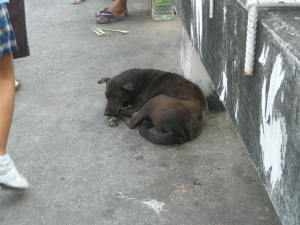Vegetarian festival: animal rights
The Vegetarian Festival is something we’ve discussed here before, and something no doubt we will be returning to annually. But in an attempt to keep it from getting too repetitive I’ll look today at a broader aspect of the inherent empathy with the state of animals in Thai culture.
 To foreigners who first see the “stray” dogs wandering the streets of Bangkok the first response is often one of distaste. They are either bothered by perceived issues of sanitation resulting from dogs and cats wandering freely about restaurants (especially the outdoor variety) or their sense that these animals are suffering and unclean, or even dangerous.
To foreigners who first see the “stray” dogs wandering the streets of Bangkok the first response is often one of distaste. They are either bothered by perceived issues of sanitation resulting from dogs and cats wandering freely about restaurants (especially the outdoor variety) or their sense that these animals are suffering and unclean, or even dangerous.
But that is a perspective rooted in experience and culture. Let’s look at it this way –
If you were a dog would you rather be relieved of your sexuality and the related organs, confined to a life indoors with only the occasional recreation time – most of which is spent on a short leash – or would you prefer to roam freely, doing as a dog chooses to do, and developing various kinds of relationships with your human cohabitants of the city?
While this may not be the case for everyone, I would much prefer to be riddled with mange and the urgency of daily living (not far from my current situation anyway) but free than I would to be someone’s eunuch plaything. And let us not ignore that while I’ve not seen any strong evidence of a government operated animal welfare or animal control organization, there are MANY animal hospitals and shelters that are publicly operated and have a focus on the animals of the street.
I have friend who manages one such hospital in Bangkok’s Hua Mark district, and they do a lot of good work with injured, sick, or otherwise desperate animals. The treatment they receive there is much like they would in my native USA. They are treated, cleaned, usually “neutered”, and then offered to folks who would like to adopt them and invite them into their own families.
It is my opinion that the underlying philosophy here is that core “live and let live” mandate that is evident, to varying degrees, at different levels of Thai social interaction. The idea of rounding up and exterminating the animals that wander freely (common practice back home) is unthinkable to many. And enough share my hatred of forced confinement and conformity that they don’t see it as their place to round the cats and dogs up to put them “in their proper place”. They are, after all, living souls with their own ideas about what they want to be up to.
And let’s look more closely at the word we use for these animals in English – stray. To stray is to wander away from the determined path, to go where one ought not to, be it in thought or action. This word, and words can be profoundly powerful on human perspective and understanding, relegates animals to subservience to and property of their human masters. While it may seem instinctive to those who have known this word in this place for too long, it is in my opinion aggressive and arrogant. It is indicative of the callous and selfish way that we see our “developed” societies approaching the planet, its life forms, its waters, its minerals, and everything else that composes this pale blue dot and the relatively fragile state that we are accustomed to its existing in. It may be a stretch of abstraction, but I see in the soi dog and random cat in the elevator a way to look at the things we share this home of ours with, including each other, as sovereign in their own existence in its relationship to itself, not to ours.
So let’s boil up some tofu and hope that the dogs who are accustomed to getting handouts from particular food stalls can hang in there until we’re all eating flesh again.

